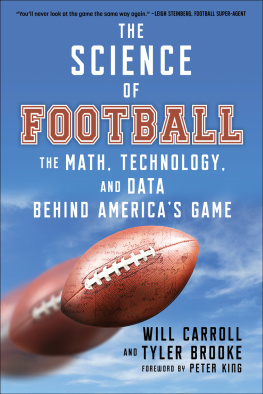Rory Smith - Expected Goals: The story of how data conquered football and changed the game forever
Here you can read online Rory Smith - Expected Goals: The story of how data conquered football and changed the game forever full text of the book (entire story) in english for free. Download pdf and epub, get meaning, cover and reviews about this ebook. year: 2022, publisher: HarperCollins Publishers, genre: Detective and thriller. Description of the work, (preface) as well as reviews are available. Best literature library LitArk.com created for fans of good reading and offers a wide selection of genres:
Romance novel
Science fiction
Adventure
Detective
Science
History
Home and family
Prose
Art
Politics
Computer
Non-fiction
Religion
Business
Children
Humor
Choose a favorite category and find really read worthwhile books. Enjoy immersion in the world of imagination, feel the emotions of the characters or learn something new for yourself, make an fascinating discovery.
- Book:Expected Goals: The story of how data conquered football and changed the game forever
- Author:
- Publisher:HarperCollins Publishers
- Genre:
- Year:2022
- Rating:5 / 5
- Favourites:Add to favourites
- Your mark:
- 100
- 1
- 2
- 3
- 4
- 5
Expected Goals: The story of how data conquered football and changed the game forever: summary, description and annotation
We offer to read an annotation, description, summary or preface (depends on what the author of the book "Expected Goals: The story of how data conquered football and changed the game forever" wrote himself). If you haven't found the necessary information about the book — write in the comments, we will try to find it.
Rory Smith: author's other books
Who wrote Expected Goals: The story of how data conquered football and changed the game forever? Find out the surname, the name of the author of the book and a list of all author's works by series.
Expected Goals: The story of how data conquered football and changed the game forever — read online for free the complete book (whole text) full work
Below is the text of the book, divided by pages. System saving the place of the last page read, allows you to conveniently read the book "Expected Goals: The story of how data conquered football and changed the game forever" online for free, without having to search again every time where you left off. Put a bookmark, and you can go to the page where you finished reading at any time.
Font size:
Interval:
Bookmark:

Mudlark
An imprint of HarperCollinsPublishers
1 London Bridge Street
London SE1 9GF
www.harpercollins.co.uk
HarperCollinsPublishers
1st Floor, Watermarque Building, Ringsend Road
Dublin 4, Ireland
First published by Mudlark 2022
FIRST EDITION
Rory Smith 2022
Cover layout design Simeon Greenaway HarperCollinsPublishers 2022
Cover photograph Oleksandr Osipov/Shutterstock.com
A catalogue record of this book is available from the British Library
Rory Smith asserts the moral right to be identified as the author of this work
All rights reserved under International and Pan-American Copyright Conventions. By payment of the required fees, you have been granted the nonexclusive, non-transferable right to access and read the text of this e-book on screen. No part of this text may be reproduced, transmitted, downloaded, decompiled, reverse engineered, or stored in or introduced into any information storage retrieval system, in any form or by any means, whether electronic or mechanical, now known or hereinafter invented, without the express written permission of HarperCollins e-books.
Find out about HarperCollins and the environment at www.harpercollins.co.uk/green
Source ISBN: 9780008484033
Ebook Edition September 2022 ISBN: 9780008484057
Version 2022-08-05
This ebook contains the following accessibility features which, if supported by your device, can be accessed via your ereader/accessibility settings:
- Change of font size and line height
- Change of background and font colours
- Change of font
- Change justification
- Text to speech
- Page numbers taken from the following print edition: ISBN 9780008484033
For Rob, who shared my algorithm
Most days, Ashley Flores wakes up at about 4 a.m. As quietly as he can, he slips out of the apartment he shares with his girlfriend and makes his way down to the small gym in the buildings basement. The skyscrapers that denote the financial heart of Taguig one of the 16 distinct cities that sit cheek-by-jowl in the endless urban sprawl of Metropolitan Manila stand sentry in the darkness.
Flores stays down there for a couple of hours. He is, first and foremost, a footballer, a forward for Mendiola FC 1991, one of the half-dozen teams that comprise the Philippines Football League. He trains with that in mind, carefully constructing workouts to improve his speed, his explosiveness, the attributes that he sees as his primary assets. Sometimes he wanders to the underground car park, to sprint up the ramps. He tries to finish every session with a half-hour swim.
It is light when he emerges. Football in the Philippines does not pay well enough for the vast majority of players to devote themselves to it full-time; a handful of superstars apart, most have to take on a second job to support themselves, too. Flores has a light breakfast, gets dressed and heads downstairs again. The apartment is expensive for Manila 160 or so a month, manageable between two but Flores is prepared to pay the premium for convenience: his office is nearby, so he can cycle to work, a blessing in a city where the roads are permanently choked by traffic.
He could, if he chose, work from home, but he likes the change of environment, the separation, the clear delineation between different aspects of his life. The office itself, rented from a co-working space, is unremarkable. The walls are white, the desks wooden. Decoration extends no further than the dozen or so Lenovo computers that sit on top of them, and the occasional potted plant. Two slender windows offer a dash of natural light. Outside, there is a cafeteria and a communal area and a suite of conference rooms, all decked out in the same neutral, pared-back decor that you might find in an office in London or Moscow or So Paulo, the kind that strips away any hint of time or place. Clues as to its location are seasonal, at best: in the Philippines, the Christmas decorations go up early, almost as soon as high summer has finished, and there is a tree in reception from September onwards.
Strictly speaking, Flores does not have to clock in at any particular time; one of the things he likes most about his job, he said, is the freedom to set his own timetable. Still, he tries to be at his desk not too long after 9 a.m. Particularly in the aftermath of the coronavirus pandemic, many of his 127 colleagues decided that they could not bear the thought of commuting anymore; even as the Philippines slowly came out of lockdown, the majority chose to work remotely. Now, he is often one of just a handful of people who still like to come into work.
Ready for the day, he takes a seat and switches his computer on. He has been doing this job for a couple of years now. He grew up in Laguna, a city a couple of hours away from Manila, and could only attend college in the capital because he won a football scholarship. His parents could not have afforded his education otherwise: his father is retired, and his uncle has long been the one who meets the day-to-day needs of the extended family, Flores said. He feels a duty to contribute, too, to send money back, and this job allows him to do that. It is not lucrative, far from it, but the pay is good, way above the Filipino minimum wage. Staring at his monitor all day hurts his eyes after a while, but it is no great suffering. There are worse ways to earn a living. He enjoys the work. He does not necessarily see it as a long-term thing he is a qualified coach, too, and wonders if he might like to do something with that but he is in no rush. He feels a debt of gratitude to the company.
Many people in the Philippines lost their jobs during the pandemic, he said. But we stayed open. They allowed us to keep working. His manager, Leo Lachmuth, a gregarious, fresh-faced German Boss Leo, to his staff remained in Manila throughout. It showed commitment, Flores said. More than that, Lachmuth set about finding ways to make his employees lives easier, setting up three regional offices outside Manila to help people continue to work.
Settled in, Flores gets to work. On his contract, he is employed as a data operator. That does not, particularly, offer an insight into precisely what it is he does, and so he and his colleagues have come up with another way of describing themselves. Their job is to watch football matches. Every time something happens, anything at all, they click a shortcut on their keyboard. They do it over and over again, for several games a week. They do it for hundreds and thousands of hours of football every year. They call themselves taggers and they are the very first building block in the sprawling, lucrative data industry that has, over the last two decades, come to dominate the sport.
The training at Packing Sports the Manila-based division of Impect, a German data analysis company that counts some of Europes biggest clubs, Bayern Munich and Paris Saint-Germain included, among its clients lasts a couple of weeks. On Flores first day, he was tasked with tagging the same game that all new starters get: Germanys demolition of Brazil, in front of a shell-shocked, mournful Maracana, in the 2014 World Cup semi-final. The choice is not solely rooted in triumphalist nostalgia, according to Lukas Keppler, Impects managing director. It is because it was the first game that really highlighted the difference between our data and what you normally see, he said. If you looked at that game, Brazil had more shots, more passes, more corners. But Germany won 71. It told you that those statistics were not telling the right story from the game.
Font size:
Interval:
Bookmark:
Similar books «Expected Goals: The story of how data conquered football and changed the game forever»
Look at similar books to Expected Goals: The story of how data conquered football and changed the game forever. We have selected literature similar in name and meaning in the hope of providing readers with more options to find new, interesting, not yet read works.
Discussion, reviews of the book Expected Goals: The story of how data conquered football and changed the game forever and just readers' own opinions. Leave your comments, write what you think about the work, its meaning or the main characters. Specify what exactly you liked and what you didn't like, and why you think so.












